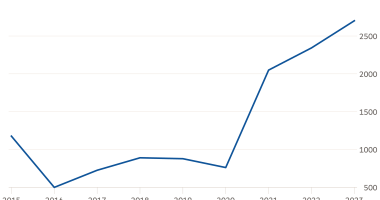A serial rapist who preyed on prostitutes was found dead in his cell at Wakefield prison after suffering a number of long-term health conditions.
Dangerous sex offender Gene Benjamin targeted women over several years and in 2011, when he was 53, was convicted of seven rapes and nine assaults from 2005 to 2010. He had targeted women in Bournemouth, Dorset, and was described by police as one of the county’s most dangerous sex offenders. A court heard that Benjamin had strangled and raped his victims, attacked them with hammers and knives and had cut off their hair.
Benjamin was described as a former crack addict who had been sent from London to Bournemouth for drug rehabilitation, according to media reports. He had remained in the area and cruised the streets looking for vulnerable women to attack. He had raped sex workers and drug addicts, according to reports.
Read more: Unsolved car wash killing and the desperate hunt for answers
Benjamin was sentenced to life, with a minimum tariff of 11 years, and was transferred to Wakefield’s maximum security jail in August 2011. The jail is home to some of the country’s most dangerous men. A report by the Prisons and Probation Ombudsman into his death in Wakefield prison concluded that he had died of end stage heart failure on February 11, 2022, at the age of 64.
A clinical reviewer concluded that the care he received at Wakefield was equivalent to what he could have expected had he been in the community. The report said he had several long-term conditions including type 2 diabetes, kidney problems, joint and muscle problems, and a range of heart conditions.
In June 2020, a health review found that Benjamin’s conditions were at an advanced staged and he was expected to live for only a few months. For much of January 2021, Benjamin reported feeling generally unwell and highlighted persistent tiredness as an issue. Blood results showed an ongoing steady decline of his kidney function.
His condition worsened and on February 3, he needed to be taken to hospital via emergency ambulance. He then tested positive for Covid and was suffering with pneumonia and a collapsed lung.
In December his condition deteriorated again and he had to be taken to hospital by emergency ambulance. On February 11, 2022, an officer found Benjamin unresponsive in his cell. A doctor confirmed his death.
Get all the latest and breaking West Yorkshire court news straight to your inbox by signing up to our newsletter here.
On March 14 2022, an inquest concluded that Benjamin died of end stage heart failure, with cardiac sarcoid and chronic kidney disease.
Benjamin’s family had complained about the quality of liaison they received from Wakefield prison before he died. The Prisons Ombudsman has made two recommendations in light of the family’s complaint.
The Ombudsman said: “The Prison Group Director should reassure themselves that HMP Wakefield has a robust system in place for providing a Family Liaison service throughout the year that can withstand the predictable absence of a single individual. The Governor and the Head of Healthcare, when making arrangements for family members to spend time with dying prisoners that go beyond normal measures, should explain to the family the constraints of the prison regime.”

(Image: Google)
Read More: World News | Entertainment News | Celeb News
YorkshireLive










